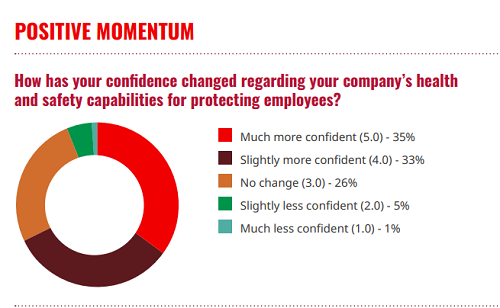Health and safety practitioners are more confident since the pandemic that their company will protect workers and that staff will comply with safety rules, a report has found.
News
More than a third say health and safety improved since pandemic, finds report
Product and safety solutions provider, RS looked at the confidence levels of 722 practitioner or senior leader role holders in the UK and Ireland. Respondents worked in a variety of sectors, including and beverage, manufacturing, energy, aerospace and rail.
The report found that 35% are now ‘much more confident’ in their company’s health and safety capabilities for protecting workers compared to pre-pandemic times.
Most (76%) have confidence in protecting staff from a disease and over half (52%) are confident that their company supports the wellbeing of their workers.
 More than a third (34%) say that compliance of employees with company health and safety policies and procedures are ‘significantly improved’ post-Covid. Photograph: iStock
More than a third (34%) say that compliance of employees with company health and safety policies and procedures are ‘significantly improved’ post-Covid. Photograph: iStock
Ryan Plummer, Senior Director for RS Safety Solutions, said the survey was encouraging, but that it has also exposed where work remains to be done: “Overall, confidence levels around both protection and compliance are rising, but gaps in training and development still exist,” he said.
“Importantly, almost a quarter are only fairly confident – or worse – that their organisations are able to select the correct PPE for specific tasks.”
Selecting the right PPE partner can help tick the few remaining boxes and help make organisations even safer in the future, he said. “Choosing the correct PPE supplier holds the key to making work safe in any environment, regardless of the task,” he said.
More than a third (34%) say that compliance of employees with company health and safety policies and procedures are ‘significantly improved’ post-Covid. Only 21% said there had been no change.
 From RS report 'Under the Surface of Health and Safety' 2023
From RS report 'Under the Surface of Health and Safety' 2023
The report, titled Under the Surface of Health and Safety, also uncovered the industry’s top worries for the future. While respondents’ top concerns for the next five years included skills shortages (51%), pressures to improve productivity (43%) and changing regulations post-Brexit (34%) long-term trends revealed a different picture.
When asked about climate change, 39% were concerned and when asked about other pandemics, 30% were also concerned. Half said that technology or digitisation was of no or little concern.
The relative dominance of the environment reflects the increasing responsibilities of the health and safety profession in this area.
Twenty-seven per cent had sustainability as an additional remit to their health and safety duties and 15 per cent, ESG. “While quality assurance dominates as an additional area that health and safety professionals are expected to cover, the results confirm that many organisations are now incorporating sustainability and ESG within health and safety roles,” says the report.
Under the surface of health and safety 2023, written in association with HSM Magazine can be downloaded here
RS Safety Solutions is a sponsor of the International Safety Awards which takes place on 19 May.
NEWS

Manufacturers call for full implementation of Mayfield Review to tackle UK sickness crisis
By Belinda Liversedge on 26 February 2026
Trends in wellbeing and long-term ill health are “worsening with the size of the problem growing, not shrinking,” the UK’s manufacturing association Make UK has warned.

Employers unprepared for menopause duties, research suggests
By Belinda Liversedge on 24 February 2026
Most employers remain uncertain about duties coming into force to support female workers undergoing the menopause, a new poll suggests.

Ramadan: what employers should know about supporting their workforce
By Belinda Liversedge on 18 February 2026
As Ramadan begins this week, UNISON has reminded employers to think about reasonable adjustments for their Muslim workforce’s religious observance such as fasting, prayers, and flexible schedules.



